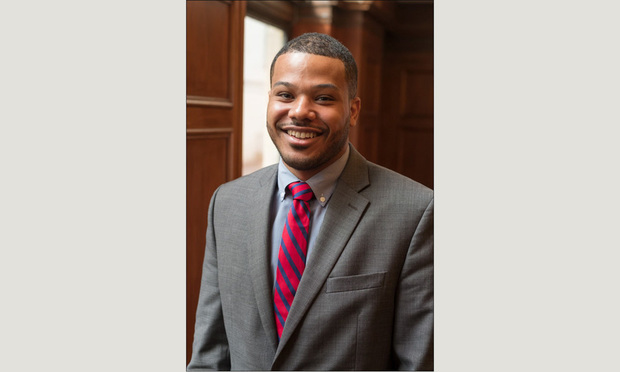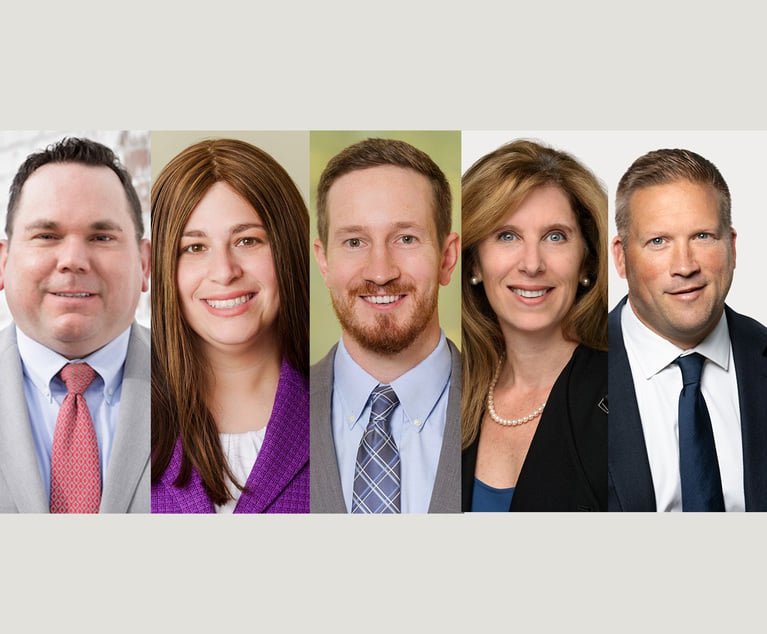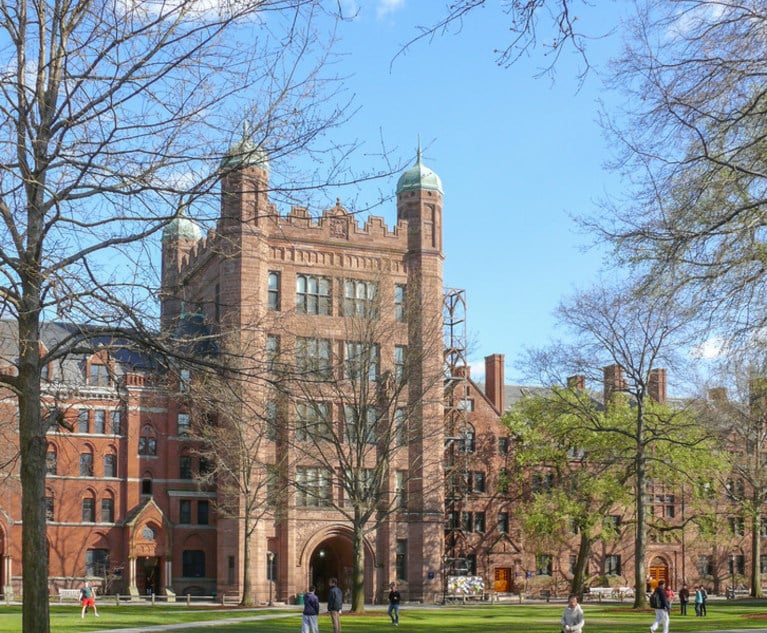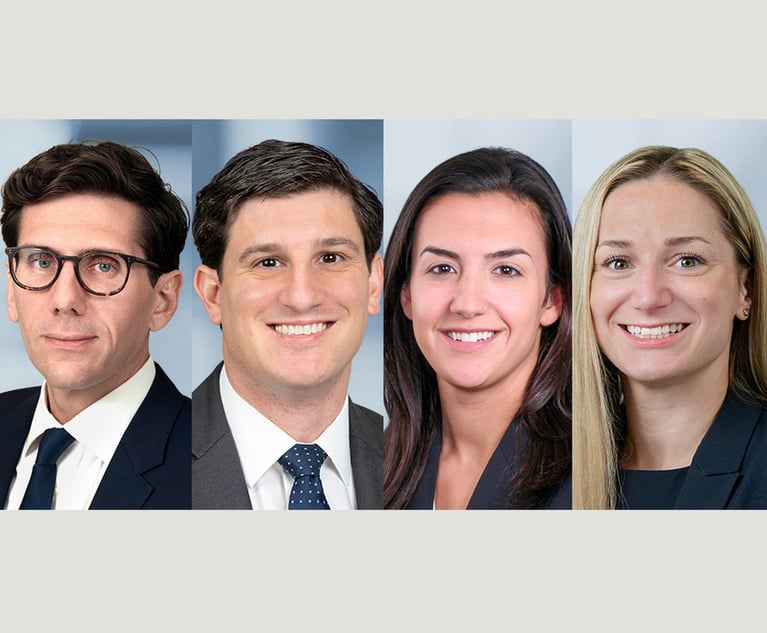'No Secret': Incoming Bar President Discusses Shortage of Black Law Partners in Connecticut
Meet Alan Bowie Jr., who will become one of the youngest-ever president of the George W. Crawford Black Bar Association on Wednesday.
June 29, 2020 at 02:01 PM
6 minute read
 Alan Bowie Jr. Courtesy photo
Alan Bowie Jr. Courtesy photo
Born and raised in New Haven, 28-year-old Alan Bowie Jr. will take the helm of the 100-member George W. Crawford Black Bar Association as one of its youngest president ever.
Bowie, who begins the one-year term Wednesday, takes office amid two national crises facing the Black community: a massive call for police reform in the wake of the May 25 killing of George Floyd at the hands of Minneapolis police and the COVID-19 epidemic's disproportionate effects on communities of color.
Bowie, who has been an associate at Carmody Torrance Sandak & Hennessey for almost four years, said he's a strong supporter of making Juneteenth, which marks the end of slavery in this country, a holiday. But he also said law firms need to "double down and take additional steps to create a more welcoming and comfortable environment for attorneys from diverse backgrounds."
A member of the George W. Crawford Black Bar Association for four years, Bowie graduated from Wake Forest University School of Law in 2016. He sat with the Connecticut Law Tribune to answer five questions.
The answers have been edited for space and clarity.
Connecticut Law Tribune: Since 2017, you have been a member of the Connecticut Bar Association's Diversity and Inclusion Committee. Where is the bar today with regard to diversity and inclusion, and what still needs to be done?
Alan Bowie Jr.: As a result of the hard work and vision of the committee, at least 38 organizations have signed onto the Connecticut Legal Community's Diversion and Inclusion Pledge and Plan.
Through this pledge, the committee can track diversity at the organizations and hold them accountable for increasing diversity, equity and inclusion. This is a huge step in solving the diversity issue, however, more work must be done.
It is no secret the number of Black law firm partners, and partners from other diverse backgrounds, has been virtually the same for the past 40 years. The same can be said for black attorneys with high-level positions at nonlaw firms. I can name each of the Black law firm partners, executive directors and general counsels at each legal organization and can likely count them on less than two full hands.
Further, I practice in a city where there has not been, at least to my knowledge, a single Black associate promoted to partner at a major law firm. This is problematic and can likely be said for any diverse category of attorney.
To spur meaningful change and to fix the diversity problem, we must make diversity, equity and inclusion a top priority. Legal organizations must determine why diversity matters to them and be honest about their diversity issues.
What are your immediate short-term goals as association president?
Bowie: Given the limitations created by COVID-19, my most immediate short-term goal is to continue to provide our normal programming to our members and service to the community.
Bar associations have been impacted severely by the pandemic, as we largely operate by hosting large in-person meetings. To observe social-distancing protocols and other legal requirements, it will be necessary to move to an entirely virtual platform until further notice.
Substantively, one of my primary goals is to focus on the second point of Crawford's mission, which is "to focus attention on legal, political and social issues which affect members of the Black community, and to address those issues as a unified body."
During my tenure as president, Crawford will work actively with its various partners to address issues of institutional racism, anti-Blackness generally and police brutality. Further, as this is an election year, Crawford will be active in the upcoming national and local elections and will continue to advocate for policy reforms that affect the Black community.
The CBA has established the policing task force, which will, among other things, facilitate conversations with a diverse group of community leaders, law enforcement officials and attorneys to hear concerns and discuss potential solutions and recommend police reforms. What will your role be with the task force, as Crawford president, and are you optimistic there can be lasting change?
Bowie: In general, my role on the task force is to represent Crawford and to communicate its position. On a personal level, I bring to the task force the perspective of a Black male who has grown up in one of Connecticut's largest cities, has developed his own views and perspective on policing reform based on that experience, and I happen to be a lawyer.
The task force is comprised of a diverse group of individuals—attorneys, law enforcement and community members—who bring with them a diverse set of experiences and are motivated to create change.
Many large law firms across the country have announced in recent weeks their plans to commemorate Juneteenth, and make that day a holiday for employees. What would you advise law firms in Connecticut and how should they mark that day beginning in 2021?
Bowie: I would advise Connecticut law firms that celebrating Juneteenth can be a very positive step for diversity, equity and inclusion, but the decision must be made in earnest.
There is great power in being more inclusive in the holidays we choose to celebrate. One common issue with increasing diversity, equity and inclusion in law firms is that attorneys from diverse backgrounds often do not feel welcome.
Celebrating more diverse holidays, such as Juneteenth, can make Black attorneys feel more welcome. However, the celebration must be genuine.
Further, I encourage firms to double down and take additional steps to create a more welcoming and comfortable environment for attorneys from diverse backgrounds.
What's one area in which the Crawford Black Bar Association can or needs to improve and be specific?
Bowie: I would like to see Crawford continue to engage with the other Connecticut affinity bar associations and the Connecticut and local bar associations.
In the wake of the murder of George Floyd, Crawford has worked closely with the affinity and Connecticut bar associations to address police brutality. In my position, I have observed these relationships are powerful and can lead to change and meaningful conversations with our various partners. I would like to see Crawford build on this synergy in other areas.
Related stories:
Connecticut Bar Association Creates Policing Task Force in Aftermath of George Floyd Killing
Connecticut Movers: Veteran Attorneys Earn Titles of Distinction
This content has been archived. It is available through our partners, LexisNexis® and Bloomberg Law.
To view this content, please continue to their sites.
Not a Lexis Subscriber?
Subscribe Now
Not a Bloomberg Law Subscriber?
Subscribe Now
NOT FOR REPRINT
© 2025 ALM Global, LLC, All Rights Reserved. Request academic re-use from www.copyright.com. All other uses, submit a request to [email protected]. For more information visit Asset & Logo Licensing.
You Might Like
View All


Discovery Seeks to Link Yale University to Doctor in Fertility Scandal
4 minute readLaw Firms Mentioned
Trending Stories
Who Got The Work
J. Brugh Lower of Gibbons has entered an appearance for industrial equipment supplier Devco Corporation in a pending trademark infringement lawsuit. The suit, accusing the defendant of selling knock-off Graco products, was filed Dec. 18 in New Jersey District Court by Rivkin Radler on behalf of Graco Inc. and Graco Minnesota. The case, assigned to U.S. District Judge Zahid N. Quraishi, is 3:24-cv-11294, Graco Inc. et al v. Devco Corporation.
Who Got The Work
Rebecca Maller-Stein and Kent A. Yalowitz of Arnold & Porter Kaye Scholer have entered their appearances for Hanaco Venture Capital and its executives, Lior Prosor and David Frankel, in a pending securities lawsuit. The action, filed on Dec. 24 in New York Southern District Court by Zell, Aron & Co. on behalf of Goldeneye Advisors, accuses the defendants of negligently and fraudulently managing the plaintiff's $1 million investment. The case, assigned to U.S. District Judge Vernon S. Broderick, is 1:24-cv-09918, Goldeneye Advisors, LLC v. Hanaco Venture Capital, Ltd. et al.
Who Got The Work
Attorneys from A&O Shearman has stepped in as defense counsel for Toronto-Dominion Bank and other defendants in a pending securities class action. The suit, filed Dec. 11 in New York Southern District Court by Bleichmar Fonti & Auld, accuses the defendants of concealing the bank's 'pervasive' deficiencies in regards to its compliance with the Bank Secrecy Act and the quality of its anti-money laundering controls. The case, assigned to U.S. District Judge Arun Subramanian, is 1:24-cv-09445, Gonzalez v. The Toronto-Dominion Bank et al.
Who Got The Work
Crown Castle International, a Pennsylvania company providing shared communications infrastructure, has turned to Luke D. Wolf of Gordon Rees Scully Mansukhani to fend off a pending breach-of-contract lawsuit. The court action, filed Nov. 25 in Michigan Eastern District Court by Hooper Hathaway PC on behalf of The Town Residences LLC, accuses Crown Castle of failing to transfer approximately $30,000 in utility payments from T-Mobile in breach of a roof-top lease and assignment agreement. The case, assigned to U.S. District Judge Susan K. Declercq, is 2:24-cv-13131, The Town Residences LLC v. T-Mobile US, Inc. et al.
Who Got The Work
Wilfred P. Coronato and Daniel M. Schwartz of McCarter & English have stepped in as defense counsel to Electrolux Home Products Inc. in a pending product liability lawsuit. The court action, filed Nov. 26 in New York Eastern District Court by Poulos Lopiccolo PC and Nagel Rice LLP on behalf of David Stern, alleges that the defendant's refrigerators’ drawers and shelving repeatedly break and fall apart within months after purchase. The case, assigned to U.S. District Judge Joan M. Azrack, is 2:24-cv-08204, Stern v. Electrolux Home Products, Inc.
Featured Firms
Law Offices of Gary Martin Hays & Associates, P.C.
(470) 294-1674
Law Offices of Mark E. Salomone
(857) 444-6468
Smith & Hassler
(713) 739-1250











